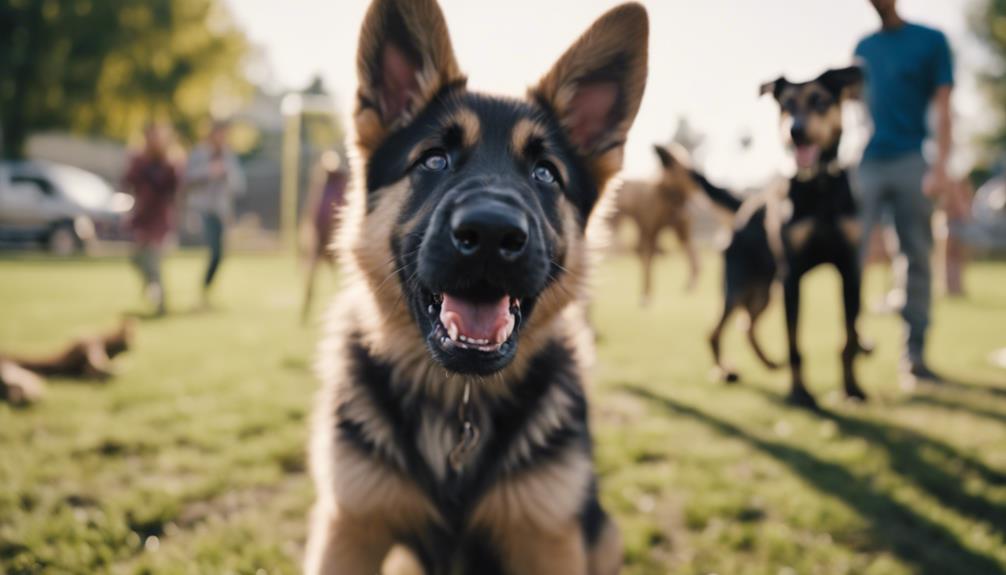🐾 Paw-some Partnership Alert! 🐾
As a pack of German Shepherd enthusiasts at MixGermanShepherd.com, we're always sniffing out the best products for our furry friends. Guess what? When you fetch something from Amazon through our links, we earn a little treat! 🦴
When it comes to socializing your German Shepherd mix puppy, starting early is key. But how exactly can you ensure that your furry companion grows up to be well-rounded and confident? By following some essential socialization tips tailored to German Shepherd mixes, you can set your puppy on the path to becoming a happy and sociable adult dog.
Key Takeaways
- Early socialization reduces fear and anxiety, establishing trust.
- Use positive reinforcement and gradual exposure for positive interactions.
- Training and diverse interactions enhance obedience and adaptability.
- Recognize signs of poor socialization and address them promptly.
Importance of Socializing German Shepherd Mix Puppies
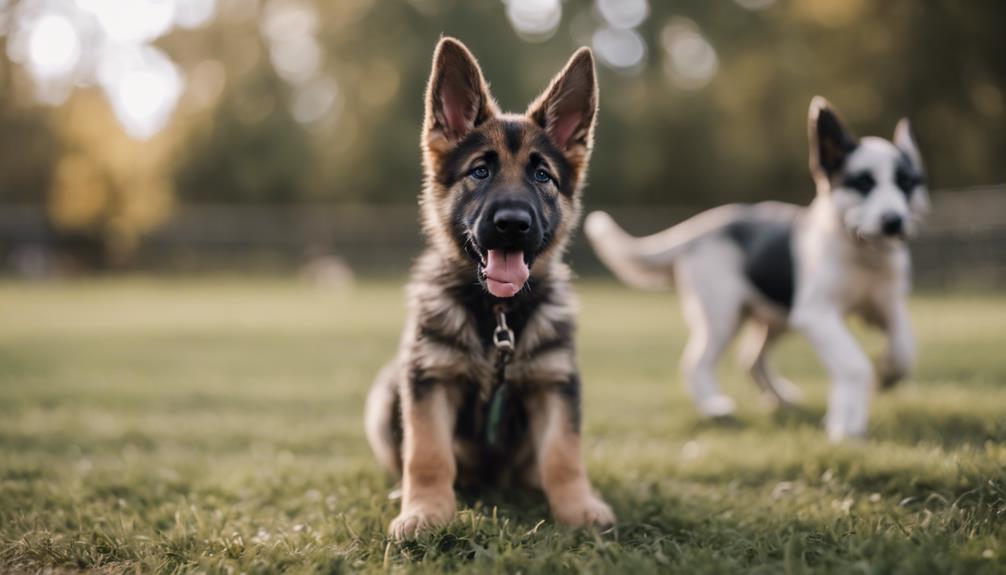
Socializing your German Shepherd mix puppy is a fundamental step in fostering well-rounded and balanced behavior that promotes healthy interactions with other animals and people. The importance of socialization cannot be overstated when it comes to German Shepherd mix puppies. It is during this crucial period that their behavior begins to develop, shaping how they will interact with the world around them as they grow. Early socialization, typically between 8-12 weeks old, sets the foundation for positive behavior patterns. By exposing your puppy to various environments, people, and animals during this critical window, you help them build confidence, reduce fear and anxiety, and establish trust in their surroundings. This early socialization not only benefits their immediate behavior but also lays the groundwork for them to become friendly, well-adjusted adult dogs in the future. Remember, the interactions your German Shepherd mix puppy has early on will greatly impact their behavior and social skills later in life.
Early Socialization Benefits for Puppies
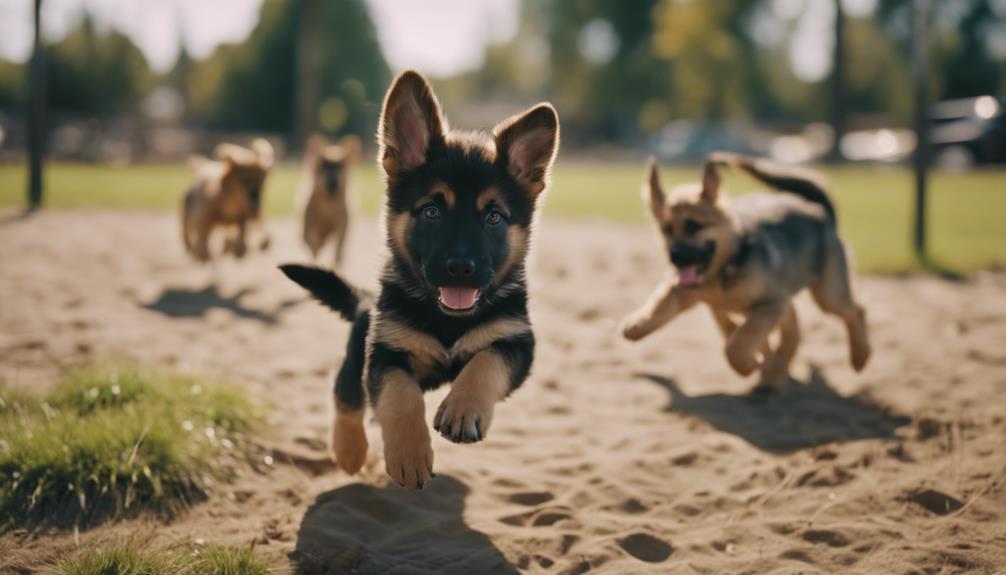
Early socialization benefits for German Shepherd mix puppies are crucial for reducing fear and anxiety in new situations. Proper socialization at a young age establishes trust and familiarity with the environment for mixed breed puppies. Socializing your German Shepherd mix puppy early on shapes positive behavior and interactions, leading to well-rounded adult dogs.
Puppies' Socialization Advantages
Properly introducing German Shepherd mix puppies to various stimuli during their critical learning period significantly enhances their adaptability and confidence. Early socialization benefits for puppies are crucial for shaping their behavior and interactions. Here are some advantages of early socialization for German Shepherd mix puppies:
- Reduced fear and anxiety in new situations.
- Building trust with humans and other animals, promoting healthy interactions.
- Prevention of behavioral issues and aggression in adult dogs.
Ensuring your puppy experiences a wide range of environments and interactions during the critical learning period of 8-12 weeks can lay a solid foundation for a well-rounded, balanced adult German Shepherd mix.
Early Social Bonds Impact
Establishing strong early social bonds with German Shepherd mix puppies lays the groundwork for positive behavior and interactions in adulthood. Socializing your German Shepherd pup from a young age with positive experiences and exposure to different environments, people, and animals is crucial. By building a strong bond through early socialization, you are helping your puppy become a confident dog who can navigate various situations with ease. Positive reinforcement during these interactions helps shape your puppy's behavior positively, reducing the likelihood of fear, anxiety, and aggression in the future. This early investment in socialization and bonding will pay off in creating a well-adjusted, sociable, and happy adult German Shepherd mix dog.
| Benefits of Early Social Bonds for German Shepherd Mix Puppies | ||
|---|---|---|
| Builds a strong foundation for positive behavior | Reduces fear, anxiety, and aggression | Fosters confidence and adaptability |
| Enhances ability to navigate new situations | Creates well-adjusted, sociable, and happy adults |
Ideal Age to Begin Socialization
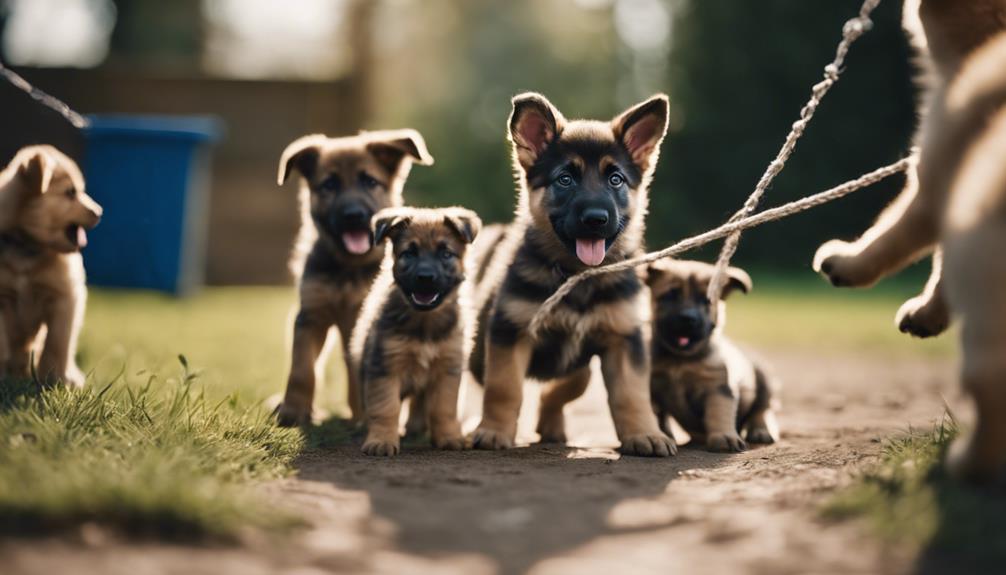
Commence socializing your German Shepherd mix puppies between 8-12 weeks old to foster positive behaviors and interactions crucial for their development. This critical period is when puppies are most receptive to new experiences, making it an ideal time to introduce them to various stimuli. Early socialization can prevent fear, aggression, and anxiety in German Shepherd mix puppies, setting the foundation for a well-adjusted and confident adult dog. Here are some key points to consider when beginning socialization at the ideal age:
- Introduce your puppies to different environments, people, and animals gradually to build their confidence and social skills.
- Use positive reinforcement techniques such as treats, praise, and rewards to encourage desirable behaviors during socialization sessions.
- Ensure that interactions are supervised and positive to create a safe and enjoyable experience for your puppies.
Starting socialization early can lead to a friendly, balanced, and sociable German Shepherd mix, enhancing their overall well-being and quality of life.
Exposing Puppies to Different Environments
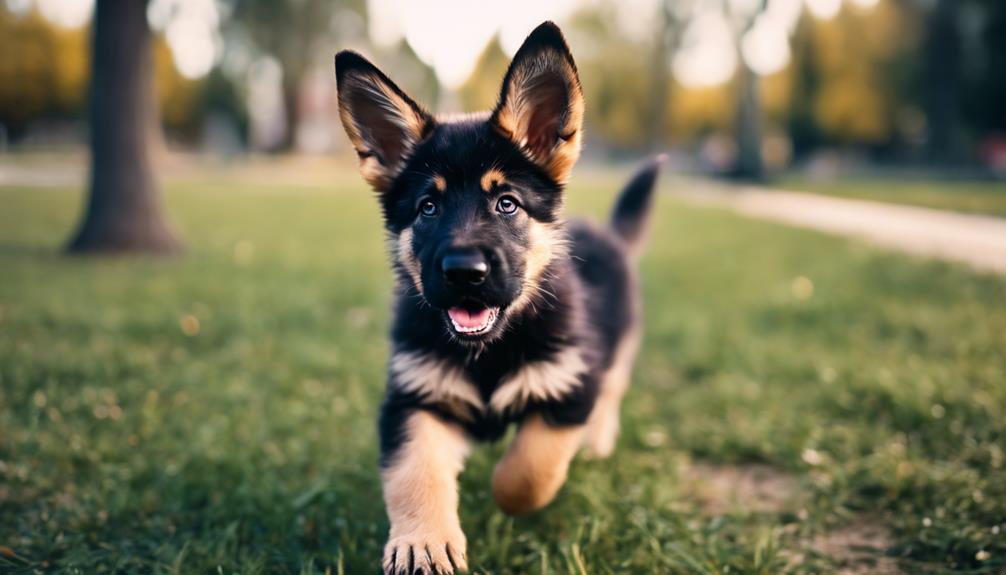
To ensure well-rounded development and confident behavior in your German Shepherd mix puppies, it is crucial to expose them to a variety of environments early on. Socializing a German Shepherd mix involves exposing them to different settings like urban environments with busy streets and crowded parks. Introduce them to rural settings such as farms, forests, and open fields to provide diverse experiences. Training a German Shepherd mix also includes socializing them in indoor environments like pet stores, grooming facilities, and obedience classes. It's essential to familiarize them with different surfaces like sand, grass, concrete, and gravel to help build their confidence. Additionally, proper socialization includes providing exposure to various sounds such as traffic noise, sirens, construction, and household appliances. By meeting new challenges in different environments, your German Shepherd mix puppies will be better equipped to adapt to various situations confidently.
Introducing Puppies to Various People
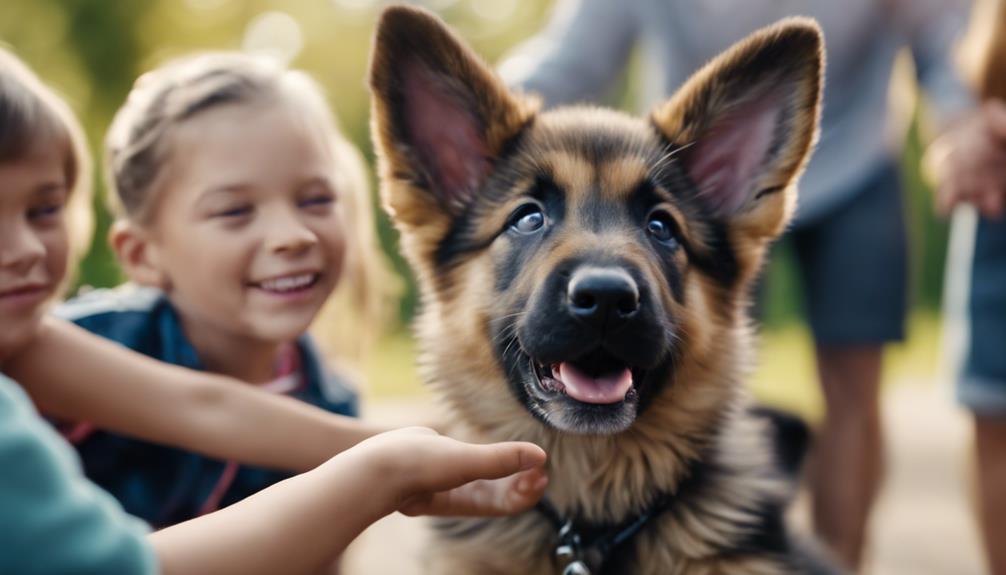
Introduce a diverse range of individuals to your German Shepherd mix puppy to foster confidence and reduce fear while socializing. It is essential to expose your puppy to various people to help them adapt to different social situations effectively. Here are some tips to ensure positive interactions with a variety of individuals:
- Different Ages: Allow your puppy to interact with children, adults, and seniors to familiarize them with individuals of all age groups.
- Varying Appearances: Introduce people wearing hats, sunglasses, uniforms, or different clothing styles to help your puppy get accustomed to various appearances and accessories.
- Diverse Backgrounds: Include individuals with different ethnicities, accents, and behaviors in your puppy's socialization process to promote acceptance and tolerance towards diversity.
Familiarizing Puppies With Other Animals
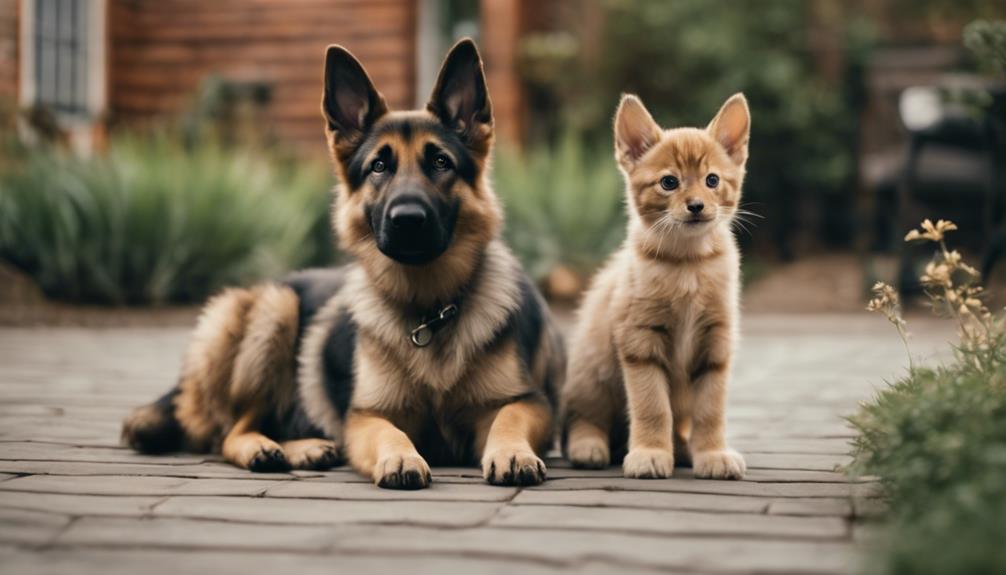
When familiarizing your German Shepherd mix puppy with other animals, it's crucial to introduce them gradually and in a controlled setting to prevent negative reactions. Begin by exposing your puppy to calm and friendly animals to help establish positive associations. Carefully supervise these interactions to ensure safety and comfort for all animals involved.
Animal Introduction Techniques
Gradually familiarize your German Shepherd mix puppy with other animals in controlled environments to prevent fear or aggression. Utilize positive reinforcement techniques such as treats and praise when your puppy interacts calmly and positively with other animals. Allow your puppy to observe other animals from a safe distance initially before advancing to closer interactions. Monitor your puppy's body language closely for any signs of stress or discomfort during introductions with other animals. Always supervise interactions between your German Shepherd mix puppy and other animals to ensure safety and promote positive experiences.
- Use positive reinforcement techniques like treats and praise.
- Allow your puppy to observe other animals from a safe distance.
- Monitor your puppy's body language for signs of stress or discomfort.
Socializing With Pets
To facilitate positive interactions between your German Shepherd mix puppy and other animals, start by allowing your puppy to observe them from a safe distance. This method helps your puppy become familiar with the other pets without feeling overwhelmed. Controlled and supervised interactions are crucial to ensure both safety and a positive experience for your puppy. Gradually introduce direct contact while monitoring their behavior closely. Use positive reinforcement, such as treats and praise, to reward calm interactions. It is essential to watch for any signs of stress, anxiety, discomfort, or aggression during socialization. By following these steps and providing a structured approach to socializing your German Shepherd mix puppy with other pets, you can help them build positive associations and develop good social skills.
Socialization Through Training Classes
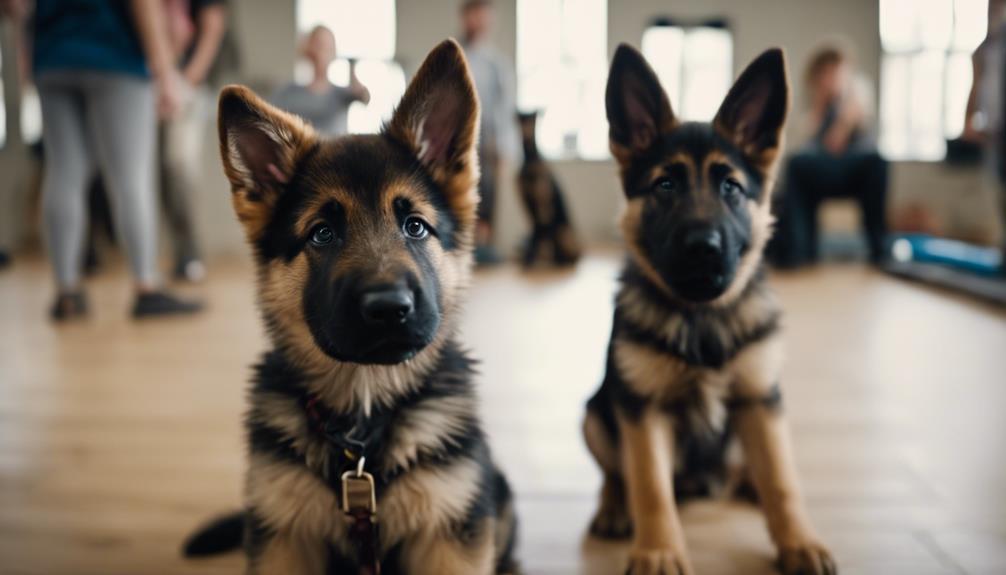
Enroll your German Shepherd mix puppy in training classes to provide structured opportunities for socialization with other dogs and people in a controlled setting. Training classes offer a conducive environment for your puppy to learn and practice social skills under the guidance of professional trainers. Here are three key benefits of socialization through training classes:
- Structured Learning: Training classes offer a systematic approach to teaching your puppy essential social skills and manners, ensuring a well-rounded development in a controlled environment.
- Professional Guidance: Professional trainers can provide valuable insights into effective socialization techniques tailored to your German Shepherd mix puppy's specific needs, helping address any behavioral issues that may arise during the training sessions.
- Diverse Interaction: Interacting with a variety of dog breeds and personalities in classes helps your puppy understand how to behave appropriately in different social scenarios, fostering adaptability and good social behavior.
Consistent participation in training classes can significantly contribute to building your puppy's confidence, enhancing obedience, and enriching their overall socialization experience.
Preventing Socialization Issues in Puppies
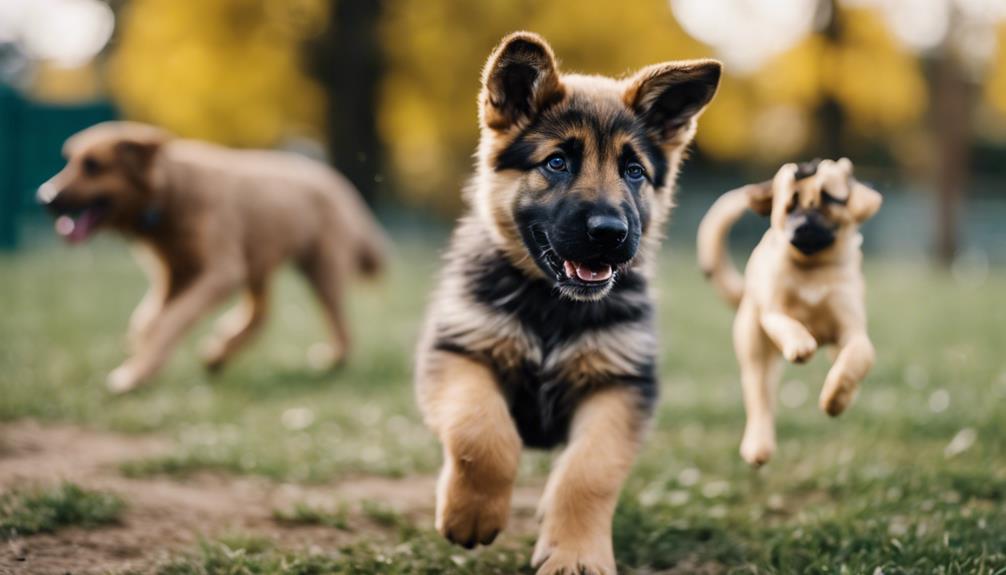
Early socialization plays a vital role in preventing socialization issues in German Shepherd mix puppies. Introduce your puppy to a diverse range of people, animals, and environments to build confidence and social skills. Positive reinforcement techniques, such as treats and praise, can help encourage desired behaviors and create positive associations with social interactions. Gradually expose your German Shepherd mix puppy to new experiences in a controlled and positive manner to prevent the development of fear and anxiety. Consistent and gentle socialization practices are key to helping your puppy grow into a well-adjusted and sociable adult dog.
| Tips for Preventing Socialization Issues | Benefits |
|---|---|
| Introduce variety of people and animals | Builds confidence |
| Use positive reinforcement techniques | Encourages social behavior |
| Expose to new experiences gradually | Prevents fear and anxiety |
Recognizing Signs of Poor Socialization
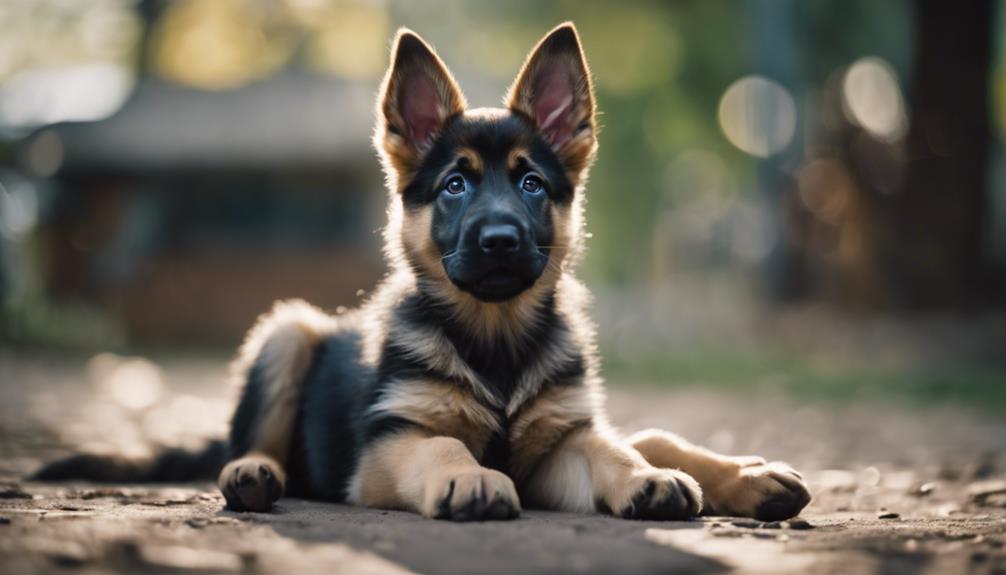
To ensure the well-being of your German Shepherd mix puppy, it is crucial to be vigilant for signs of poor socialization. Behavioral red flags such as excessive fear, aggression, or avoidance behaviors can indicate inadequate socialization. Recognizing these signs early on is essential for implementing targeted interventions and fostering a well-adjusted and confident companion.
Poor Socialization Signs
Recognizing signs of poor socialization in German Shepherd mix puppies can be crucial for addressing behavioral issues early on and ensuring their well-being and development. When observing your puppy, watch out for the following indicators:
- Excessive fear or anxiety in new environments
- Aggression towards people or other animals
- Avoidance of social interactions and withdrawal behavior
These signs may suggest that your German Shepherd mix puppy has not been adequately socialized. Poor socialization can lead to difficulties in adapting to new situations and may result in destructive behavior or excessive barking due to fear and anxiety. By recognizing these signs early on, you can take steps to help your puppy overcome negative experiences and improve their social skills.
Behavioral Red Flags
Observing behavioral red flags in German Shepherd mix puppies can provide valuable insight into their socialization level and potential need for intervention. Poorly socialized German Shepherd mix puppies may exhibit signs such as excessive fear, aggression, and avoidance of social interactions. Recognizing these behavioral red flags early on is crucial for addressing inadequate socialization and preventing further issues. Signs like excessive barking, growling, cowering, destructive behavior, lack of confidence, withdrawal from new experiences, and difficulty adapting to change are indicators that a puppy may not have been adequately socialized. By observing how these puppies interact with other dogs, people, and new environments, you can gain essential information about their socialization level.
| Behavioral Red Flags | Description |
|---|---|
| Excessive fear | Prolonged or intense fear responses to stimuli |
| Aggression | Hostile or violent behavior towards others |
| Avoidance | Persistent efforts to escape or avoid social situations |
| Destructive behavior | Damaging items or property without apparent reason |
| Lack of confidence | Timid or insecure demeanor in various situations |
Early Intervention Importance
For optimal development in German Shepherd mix puppies, timely intervention to address signs of poor socialization is imperative. Recognizing signs of poor socialization is crucial for the well-being of your puppy. Here are key signs to watch for:
- Fear, aggression, and anxiety in new situations
- Timid behavior and difficulty interacting with people or animals
- Fear of new environments
Early intervention plays a significant role in preventing behavioral issues, fear-based aggression, and social difficulties in your puppy. By identifying signs of poor socialization early on, you can implement targeted interventions to help your puppy adjust and thrive socially. Remember, your proactive approach can make a world of difference in your furry friend's development.
Socializing Older German Shepherd Mixes
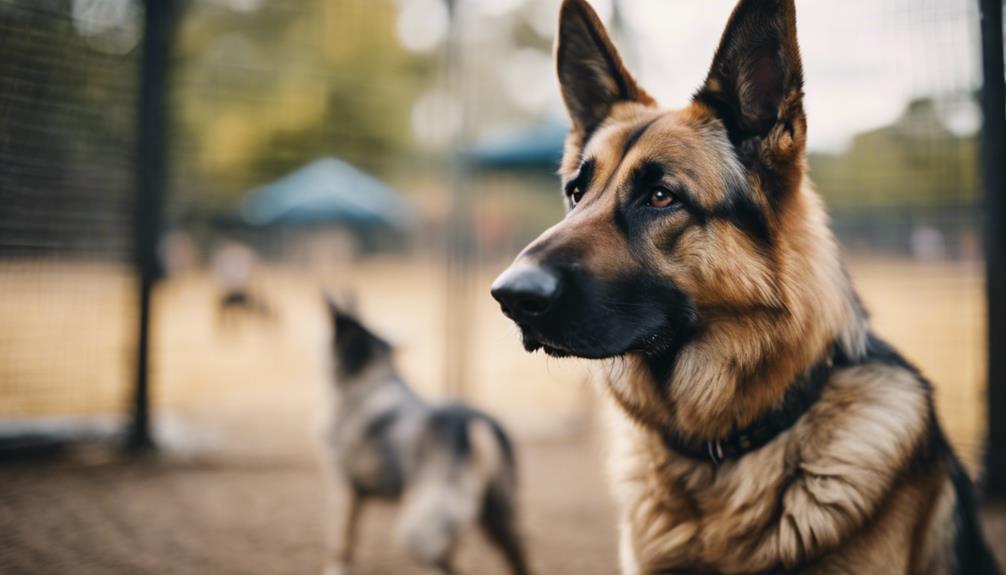
When socializing older German Shepherd mix dogs, it is crucial to approach the process with patience, understanding, and a deep respect for their individual backgrounds and temperaments. Older German Shepherds may have varying socialization needs influenced by their history and temperament. To effectively socialize them, consider their past experiences, social interactions, and behavioral cues. Tailoring the socialization process to each dog's unique personality is essential for success. Slowly introduce new experiences, environments, and interactions to prevent overwhelming these dogs. Utilizing positive reinforcement, consistency, and gradual exposure are key elements in helping older German Shepherd mixes become more comfortable and confident in various social situations. By understanding and addressing their individual needs, you can create a positive and enriching socialization experience for your older German Shepherd mix, strengthening the bond between you and your furry companion.
Encouraging Positive Dog-to-Dog Interactions
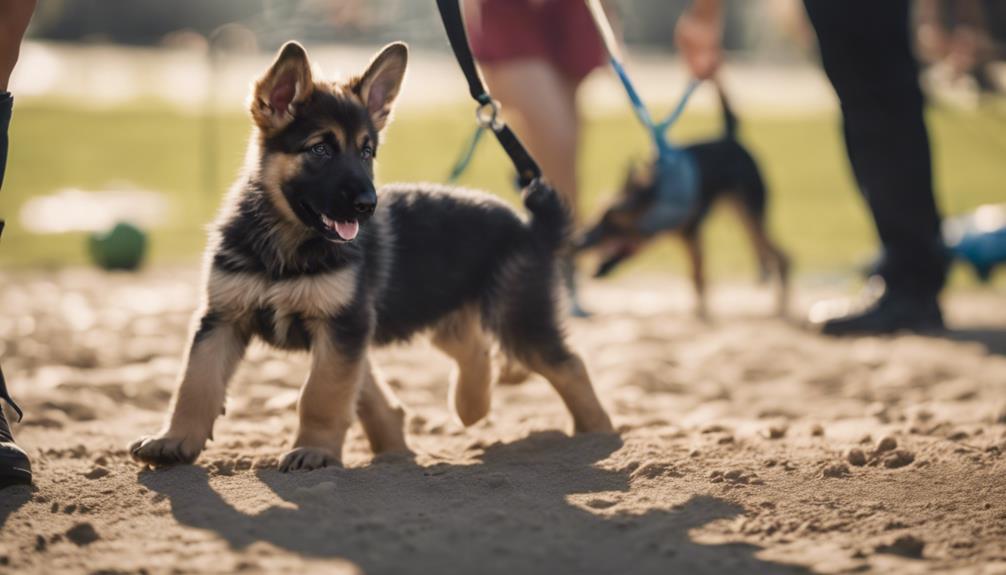
To foster healthy interactions between your German Shepherd mix puppy and other dogs, prioritize supervised playtime and positive reinforcement techniques. When encouraging positive dog-to-dog interactions, consider the following:
- Socialize with Various Breeds and Sizes: Expose your German Shepherd mix puppy to dogs of different breeds and sizes to promote adaptability and positive socialization skills.
- Encourage Friendly Body Language: Teach your puppy to display non-threatening body language, such as loose movements and soft eye contact, to signal friendliness to other dogs.
- Reward Good Behavior: Use treats, toys, or verbal praise to reward your puppy for displaying good behavior and engaging in positive interactions with other dogs.
Fun Socialization Activities for Puppies
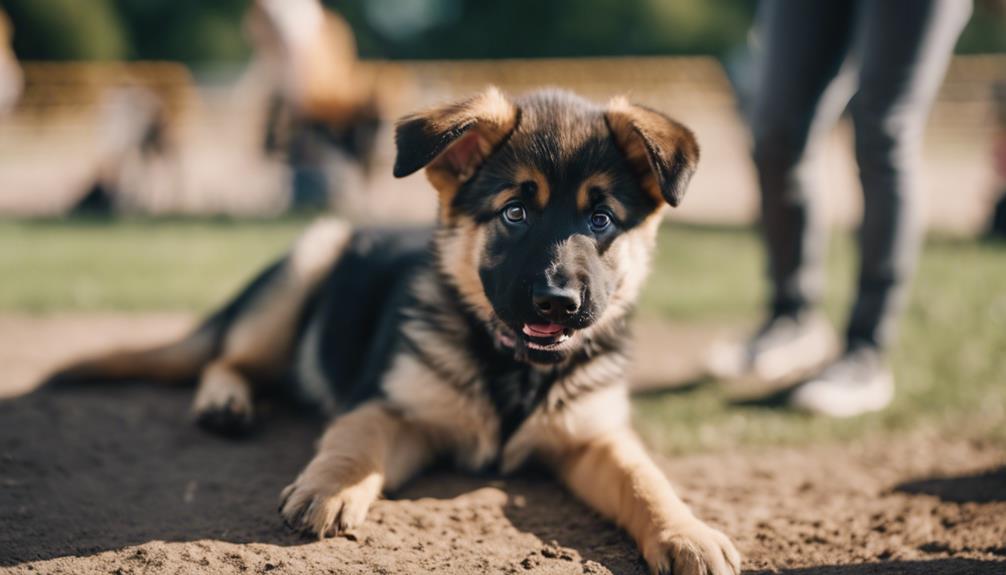
Engage your German Shepherd mix puppy in a variety of stimulating socialization activities to promote healthy development and enhance their social skills. Introduce interactive training sessions into your routine to reinforce positive behaviors and boost your puppy's confidence. Puppy playdates are a fantastic way to encourage socialization with other dogs, fostering better social skills. Take your puppy to dog-friendly events and gatherings to expose them to various environments and people, helping them adapt to new experiences. During walks, introduce your puppy to different surfaces, textures, and sounds to further their socialization and confidence. Incorporate treats, toys, and praise as rewards during these activities to create a positive association with new encounters. By engaging in these fun and interactive socialization activities, you are not only strengthening the bond with your German Shepherd mix puppy but also setting them up for success in various social settings.
Frequently Asked Questions
How Do I Socialize My German Shepherd Puppy?
To socialize your German Shepherd puppy, arrange puppy playdates, attend obedience classes, and provide daily exposure to various environments. Use positive reinforcement, controlled interactions, and confidence-building activities to foster essential socialization skills for your pup.
How Do You Bond With a German Shepherd Puppy?
To bond with a German Shepherd puppy, engage in interactive games, use positive reinforcement, explore outdoor adventures, practice obedience training, take daily walks, schedule play dates, and attend puppy classes. These activities foster trust and strengthen your connection.
How Much Socialization Does a German Shepherd Need?
For a German Shepherd, socialization needs are significant. Starting early and maintaining a consistent socialization timeline is key. Engage in various socialization techniques daily, including exposure to different environments, dogs, strangers, children, and public spaces to foster well-rounded behavior.
Is It Too Late to Socialize My German Shepherd?
It's never too late to start socializing your German Shepherd. Even if there are behavior changes, consistent training techniques can help. Address social fears with positive experiences, patience, and professional help if needed.
Conclusion
In conclusion, the socialization of German Shepherd mix puppies is a critical component in fostering well-rounded and confident adult dogs. By starting the socialization process early and incorporating various environments, people, and positive experiences, you are setting the foundation for a socially adept and emotionally stable companion. Remember, the impact of socialization on your puppy's development cannot be overstated – it truly is the key to unlocking their full potential as a well-adjusted canine citizen.
